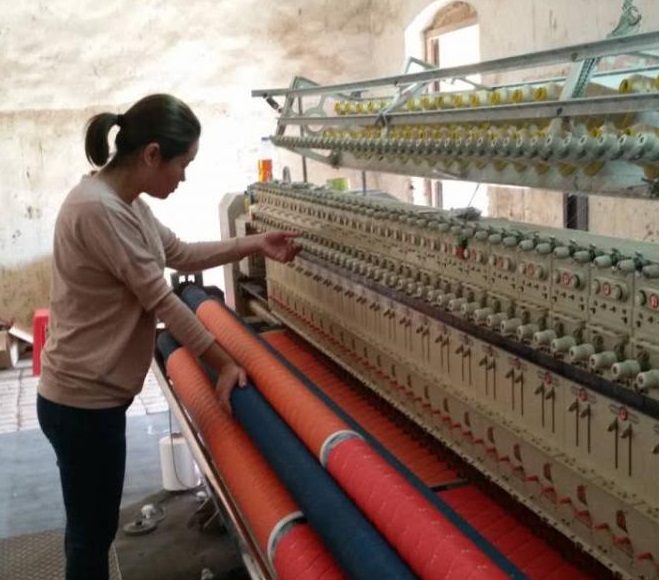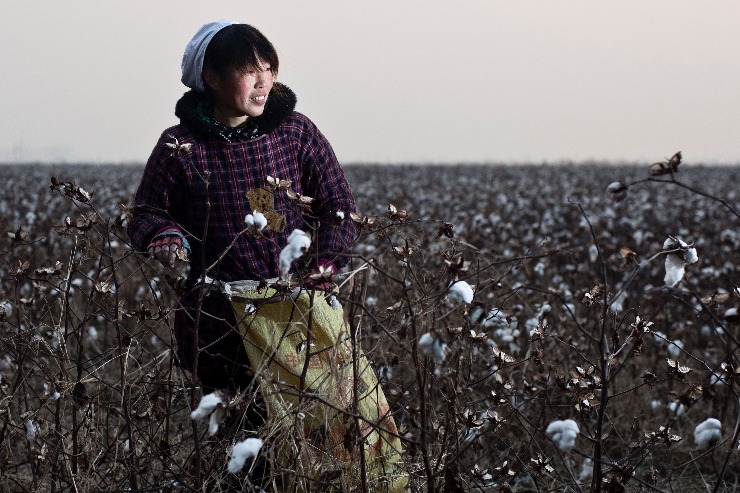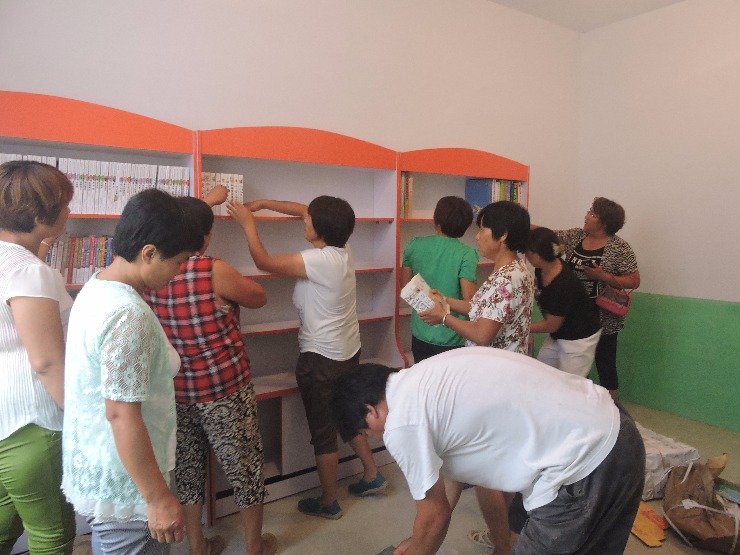“I met women who were running successful businesses,” said Wenshu. “Inspired by their success, I felt I could do something similar too.” Supported by the project’s training in business development, she purchased a quilting machine and started a cushion-making business. Today, her enterprise is providing her a better livelihood.

Wenshu Zhao in her cushion-making factory
China is the world's second largest cotton producer, after India. Nearly 20 million smallholder farmers lead Chinese cotton production, with an average landholding of just 0.3 hectares per farmer. Small farm sizes, compounded by challenges including high input costs, low productivity, and inadequate support mechanisms lead to low profits for these farmers. As a result, many men migrate to urban areas seeking better livelihoods. The “left behind” rural population is primarily women, children and the elderly. Hence, women end up bearing the heavy burden of farming, family and household chores.
Cotton farming is highly labour-intensive, further increasing the pressure on the women. Studies indicate that these left-behind women have worse mental health than other women in China, manifested in psychological stress, loneliness and fear. Suicide rates for rural Chinese women have been exceedingly high in the recent past. This has been mainly attributed to poverty, low self-esteem, family conflicts, stress, and easy access to toxic agrochemicals. The overuse of pesticides and other agrochemicals in cotton production also leads to health hazards, not to mention negative environmental outcomes.
A New Beginning
Drawing on its extensive experience in supporting the production of sustainably produced cotton with smallholder farmers in China, Solidaridad started a project in 2014 that specifically addressed the needs of women cotton farmers in Hebei and Xinxuan provinces. Funded by the Walmart Foundation, as part of its Women’s Economic Empowerment Initiative, the project was implemented by Solidaridad in China with support from Solidaridad North America.
Together with its partners, the Beijing Cultural Development Center for Rural Women, the Social Resource Institute and The China Academy of Agricultural Sciences, Solidaridad organized workshops focused on the production of Better Cotton Initiative (BCI) certified cotton, reaching out to both male and female farmers. Important topics such as Integrated Pest Management (IPM) and water and fertilizer management were covered. Farmers were introduced to resources such as the expert hotline set up by the Hebei Agricultural Technology Extension Center. As a result, from 2014 to 2016, 4,699 metric tons of BCI verified lint cotton was produced by smallholder cotton farmers in China, of whom 44% were women. The women were also key to ensuring that the health and safety regulations related to cotton production were adhered to.

A farmer picking cotton in China
Building Leadership and Community
Simultaneously, Solidaridad focused on building the leadership skills of women farmers. Groups of leaders, each consisting 15-20 women per village, were established across 19 project sites. A two-day training on various aspects of women’s empowerment, community organization and leadership was held for all the leaders in Beijing. Thereafter, field schools were set up in each village, where the leaders shared what they learned with the women in their village and mobilized them to get together to carry out different activities.
Upon assessing the women’s needs in the project sites, workshops, public lectures and field trips on topics such as gender equality and women's rights, parenting, women’s health, children’s education, leadership skills and entrepreneurship were conducted. From organizing village cleanups and improving waste management to setting up rural libraries and organizing community celebrations, the women had opportunities to exercise their leadership and organizational skills, while strengthening bonds within their communities.
Yanjing Yang, a cotton farmer in Guanzhuang village, was one of the leaders. She leads a “square dancing” group in her village; a popular activity in China, where women dance for both exercise and leisure. After participating in the training, Yanjing mobilized her colleagues to look after the elders, who are often lonely and ignored in the villages. During the Double Ninth Festival (festival for elders), they even organized a dumpling feast for the elders. The villagers were deeply moved by this gesture. Yanjing shared, "Ever since I joined the gender project, I have changed a lot. Not only did I become lively, open, optimistic and confident, I also realized that being compassionate is a woman’s strength.”
Women setting up a rural library
Enhancing Livelihoods
During 2014 and 2015, a change in Chinese government policies made cotton farming unprofitable for smallholder farmers. Lacking alternative livelihood options and with limited capacities to seek new opportunities, women farmers were particularly affected. In response, Solidaridad rapidly adapted the project in order to equip the women with entrepreneurial skills, allowing them to seek new income generating opportunities.
The project trained the women to assess market prospects, create products and services and develop business plans. They were mentored, by experts in evaluating and executing business plans, using Chinese communication cellphone apps such as QQ and WeChat. Consequently, some women went on to establish small enterprises in their villages. For instance, Xiangping Zhang from Siwang village started breeding pigeons for meat in 2017. She built a breeding house and bought 1,000 baby pigeons. When the pigeons grow up, it is estimated she can earn 10,000 RMB (approx. USD 1500). Recognizing this as a lucrative opportunity, five other women set up pigeon breeding businesses.
Liyun Hao, a cotton farmer in Zhaier Village, participated in “Heli Plan,” a training held by the Consultation Center of Farmers’ Associations (CCFA). After the training, all participants were asked to submit a grant proposal for a microproject. While this was Liyun’s first time writing a proposal, the knowledge she had gathered from the Solidaridad project gave her immense confidence. The training sessions on women’s health had moved her deeply. Her sister had died of a gynecological disease, due to lack of knowledge and the avoidance of medical help, out of shame. So, Liyun developed a proposal on raising awareness about women’s health. The judges were impressed by her proposal and her responses to the jury. She was one of five winners, out of 30 applicants, and won funding worth 5,000 RMB (approx. USD 760). Upon returning to her village, Liyun mobilized a group of women to organize a quiz contest for the community. She also printed and disseminated calendars to promote awareness about health issues. Liyun said, “Thanks very much to Solidaridad and the Walmart-supported project for providing me a platform to learn new knowledge, transform my mindset, rebuild confidence and discover myself.”

Women leaders sharing their experiences from the project
Over three years, the project reached 14,254 people in 21 villages. The initiative enabled the women to realize that there could be new ways of thinking and leading their lives. They recognized that women need not merely look after their husbands and children. Instead, they could contribute much more to themselves, their families and communities. Solidaridad is optimistic that the early possibilities of change demonstrated by the project will grow deeper roots and benefit the lives of the women and their communities in the long-term.
Watch the short film above on the project, “Creating an Enabling Environment for Female Farmers in the Cotton Supply Chain.”
Learn more about Solidaridad's programmes for sustainable cotton.

